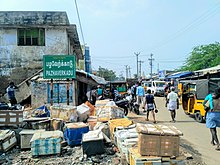Pulicat, also known as Pazhaverkadu (Tamil: பழவேற்காடு Paḻavēṟkaṭu), is a historic seashore town in the north coast of Tamil Nadu, next to the Pulicat Lake. Pulicat Lake is a shallow salt water lagoon which stretches about 60 km (37 mi) along the coast.
Understand
edit
The Portuguese established a trading post in Pulicat in 1502 with the help of the Vijayanagar rulers. They built a fort there and held this fort until 1609 when they were defeated by the Dutch. The Dutch occupied Pulicat fort in 1609. Between 1621 and 1665, 131 slave ships were deployed by the Dutch to export captured on the Coromandel coast. 38,441 Indians were transported from Pulicat to be sold as slaves to Dutch plantations in Batavia. Pulicat was until 1690 the capital of Dutch Coromandel. It repeatedly changed possession, until finally occupied by the British in 1825.
Pulicat is within the Pulicat Lake Bird Sanctuary. Every year between October and March, thousands of migratory birds land here. Though many species can be seen, the flamingos are the most visible, covering the swamps surrounding the lake, giving it a pink tinge.
Get in
editIt is about 60 km (37 mi) north of Chennai and 3 km (1.9 mi) from Elavur, on the southern periphery of the Pulicat Lake.
Get around
editSee and do
edit- 1 Fort Geldria (Fort Geldaria). The former seat of the first Dutch settlement in India. It was the only Dutch fortification in India; all other positions of the Dutch East Indian Company were trading posts.
- 2 Pulicat Lake Bird Sanctuary. The second largest brackish water lagoon in India after the Chilika Lake in Odisha. Every year between the months of October and March, thousands of migratory birds land here. Though many species can be seen, the Flamingos are the most visible, covering the swamps surrounding the lake, giving it a pink tinge.
- The Dutch church has been built over several times and is rather dilapidated today, and the Dutch fort has fallen into ruin.
- The old lighthouse still stands at the opposite bank of the lake.
- The cemetery dating to 1622 has grand, Dutch-inscribed tombs and graves, carved with skeletons rather than the cross, have been quite well preserved. The cemetery lies behind the market.
- Aadhi Narayana Perumal temple is an old temple located at Pazhaverkadu.
- Pulicat Day is celebrated on World Wetland Day (2 February) at Pulicat. Famous traditional catamaran competition and several competitions are held on this day.
- A small information centre (Pulicat Museum) at Pazhaverkadu gives detailed information on Pulicat ecology and built heritage.

